Peter MALONE
Saturday, 18 September 2021 19:34
Milky Way, The
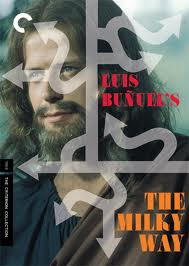
THE MILKY WAY
US, 1936, 88 minutes, Black and white.
Harold Lloyd, Adolphe Menjou, Verree Teasdale, Helen Mack, William Gargan, George Barbier, Lionel Stander.
Directed by Leo Mc Carey.
The Milky Way is a star vehicle for silent star Harold Lloyd. He is enjoyable in this talkie comedy. He relies on a lot of sight gags, clowning. However, he carries his own in the humour and verbal humour department. It is the story of the little man, the milkman, who is good at ducking and weaving and so is hailed as a champion because he knocked out the reigning champion. This plot builds up with complications by the fight promoter (played well by Adolphe Menjou) and climaxes in a confrontation with the champion - and a happy ending. Direction is by Leo Mc Carey who directed the Marx Brothers in Duck Soup and then developed into a director of romantic comedies including Going My Way, The Awful Truth, The Bells of St Mary's.
1. Harold Lloyd as a popular star? His comedy style? Silent and sound?
2. The work of Leo Mc Carey, comedy, pacy, action, verbal comedy? The original play opened out for the screen?
3. The introduction to Burleigh: the discussion about the milk runs, his burping, the boss, his love for Agnes the horse?
4. His sister, the encounter with Speed and Spider, the knockout, the press and the consequences, his going to see the fighters, K.O-ing Speed again? Discussions with Gabbi, the story of his being attacked while young, his ability to Duck?
5. Gabbi and his worry, Anne and their relationship for 15 years, Speed and Spider, the attack, his nerves, listening to Burleigh, his plan, persuading Burleigh to sign the contract, his campaign?
6. Burleigh and Agnes, getting the doctor, meeting Polly, at the barber's shop? His training, Anne teaching him how to dance and punch? Ducking? The fights, his fear, avoiding them, persuaded to fight, winning? The collage of his victories? His triumph and his change of personality? Teaching the society lady to duck? Polly telling him the truth about himself? Agnes?
7. Spider, tough, training, the fall-guy?
8. The build-up to the finale, contracts, radio and their all listening, the fight, the win? A happy ending for a11? 1920s silent comedy tradition into sound?
Published in Movie Reviews
Published in
Movie Reviews
Tagged under
Saturday, 18 September 2021 19:34
Mickey and Nicky
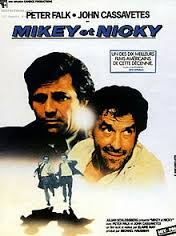
MIKEY AND NICKY
US, 1976, 118 minutes, Colour.
Peter Falk, John Cassavetes, Ned Beatty, Sanford Meisner, Rose Arrick, Joyce Van Patten.
Directed by Elaine May.
Mikey and Nicky was written and directed by comedienne Elaine May. May had written a number of comedy sketches with her then husband, director Mike Nicholls. She also appeared with Walter Matthau in the film A New Leaf.
As a film-maker, she is eccentric and extravagant. This reached a peak in the mid-'80s with the amount of money spent on the comedy Ishtar with Warren Beatty and Dustin Hoffman, which she wrote and directed. With this film, long unreleased and then mainly on video and television, she gives an opportunity for John Cassavetes and Peter Falk to improvise their acting for almost two hours. The film is a two-hander between two gangsters, Mikey, who is pursued by the mob and about to-be killed and goes through his life, and Nicky, his friend, who ultimately betrays him.
The film will be exceedingly tedious to watch for most audiences - although the two actors give tour de force performances. Ned Beatty appears as an assassin. A piece of specialised Americana.
1. The impact of the film, portrait of two characters, their situation, interaction? The skill of their improvised acting? The editing of their performances together? The audience's ability to stay with the performances?
2. The title, friendship, the truth of the two characters?
3. Elaine May, her writing, directing, film-making style?
4. The basic situation: the death of the criminal and the report in the newspaper, Nicky and his fear, in the hotel, dependence on Mikey, paranoia, the friendship, the anguish? His sharing his anguish and his life with Mikey? The talk, the insights into their personal style, relationship over many years? Argument? The review of their life? The hotel sequences, the life of the city, eating together, the cinema, the visit to the cemetery, the girl and sex, the growing dangers, the visit to family, the ultimate betrayal?
6. The actors and their improvising skill, insights? Nicky and his desperation, acting it out, fear, love, friendship, exploring the meaning of his life? Mikey, tentative, friendship, sharing, clash, betrayal?
7. The assassin and the contact, his driving, the wrong street, contact with the bosses, the criminal boss and the friends, meetings and discussions? Mikey and the contact with the assassin? The communications, the shooting?
8. Mikey and his family, the phone calls, contact and betrayal, with his wife, the ultimate fear, Nicky shot at the doorstep?
9. The effect of this two-hour experience of being close to two characters, their lives, meanings, frustrations, betrayal and death?
Published in Movie Reviews
Published in
Movie Reviews
Tagged under
Saturday, 18 September 2021 19:34
Mesmerised

MESMERISED
New Zealand, 1986, 94 minutes, Colour.
John Lithgow, Jodie Foster, Michael Murphy, Dan Shor, Harry Andrews, Jonathan Hardy.
Directed by Michael Laughlin.
Mesmerised is an American/New Zealand/Australian co-production from Anthony I. Ginnane. It was written and directed by Michael Laughlin, who also made Dead Kids with Ginnane in New Zealand. He also directed Strange Invaders. The story is based on work by Polish director, Jerzy Skolimowski.
The film boasts turn of the century settings, attractive location photography, a musical score by Georges Delerue.
The film has a strong cast: co-produced by Jodie Foster, she gives a persuasive performance (accent and all). Also effective is John Lithgow in an unsympathetic role. Supporting cast includes Dan Shor (from Dead Kids) and Michael Murphy. Australian and New Zealand actors and actresses fill out the supporting roles.
The film is a period piece (in the tradition of the Victorian Gothic melodramatic stories and Jane Eyre). An Australian comparison could be made with Di Drew's The Right Hand Man.
1. Interesting and entertaining period drama? Psychological drama? New Zealand-American? co-production?
2. The co-production and its talent, Skolimowski's story, New Zealand locations, American and British cast?
3. The atmosphere of New Zealand, the period, the decor and costumes, locations and scenery? Interiors and exteriors? Light and darkness? The atmospheric score? Maori music?
4. The title and the background of Mesmer and hypnotism, the effect on each of the characters: on Oliver and his susceptibility, on Victoria and her interest and susceptibility, on Wilson introducing them to mesmerism? The responsibility for Oliver's death?
5. The prologue and the unfortunate Victorian mother, the child taken from her? Victoria growing up in the orphanage, its primness, hilarity with the other girls, in the bath...? No visitors? Oliver's arrival, the interview, the arranged marriage, the wedding, her going back to school?
6. The significance of the voice-over and audience confidence? Victoria's perspective? Yearnings for freedom? Hopes for marriage?
7. The marriage, her leaving school, the isolation, the household and the antipathy of the servants, Oliver away, his peephole, his approaching her and her dread of sexuality? Loneliness, reading, piano, the dogs? Oliver as voyeur? The friendship with George and the affection? Old Thompson and his arrival, his arrogant disdain of her? Her escape, going to the boat with George, the dream of freedom, being with George? The fight, her hitting George on the head by accident, Oliver and his father and their hold over her?
8. Her return, imprisonment, relationship, sexuality, pregnancy? Going to see the lawyer? The sermon and the introduction to James Wilson, sharing interests, meals, the holidays, mesmerism? Trying it out, getting Oliver to wound himself with the scissors? Wilson mesmerising her? The birth, the death of the baby and her sadness? Loneliness, discovering George's letter and the truth? Oliver and his illness, preparing the meals, mesmerism, the chloroform, his attempting to strangle her, his death? The visits to the doctor, the visits of the servants and their suspicions- leaving, Old Thompson and his hostility and vengeance, the trial and animosity, her seeming to be a victim? Not guilty, the applause? The theatre and the lawyer? The writing the letter to George? Her future - going to America? To that he had mesmerised her and asked her to kiss the man she loved?
Wilson - and the memory?
9. Oliver in himself, wealth, the arranged marriage, the wedding, his absence, the gift of the music box, voyeur, sexuality and dominance, his father and his imitation of him, the servants? Going to the ship and his hold over Victoria? Concealing the letter from George? The birth of the baby and its death? The holiday, mesmerism? The rats in the store, the clearing of the rats, his illness? The reading, his pain, the agony of having his teeth withdrawn? The chloroform? Death and attempting to strangle Victoria? His dying?
10. Old Thompson and his arrogance? Concealing the letter from George? Hostility towards Victoria and the trial? George, affection, his being injured, the letter, the finale?
12. Wilson and his religion, sermons, helping, Victoria with him at work, the mesmerism? Looking in the window at Victoria and Oliver? Disappearing before the trial? His return to America?
13. The servants, their attitudes towards Victoria, working with her, antagonism?
14. The sketch of the orphanage, life in the towns, the law courts?
15. A blend of thriller, horror and psychology? Relationships, arranged marriages, men and women, manipulation of others?
Published in Movie Reviews
Published in
Movie Reviews
Tagged under
Saturday, 18 September 2021 19:34
Maxie
MAXIE
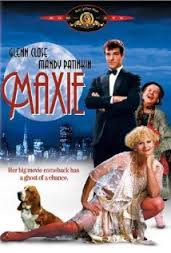
US, 1985, 98 minutes, Colour.
Glenn Close, Mandy Patinkin, Ruth Gordon, Valerie Curtin, Barnard Hughes.
Directed by Paul Aaron.
Maxie is a pleasant ghost story in the Topper tradition. It offers Glenn Close an opportunity for comedy - as the rather restrained archbishop's secretary in contrast with the flapper Maxie Malone. She is well-matched in a performance by Mandy Patinkin as her husband. Ruth Gordon, in one of her last films, is the old showgirl from the '20s. Barnard Hughes is the bishop.
The film pays tribute to the old styles of the '20s, the early film-making - as well as having some pleasant spoof shops at contemporary film-making. Direction is by Paul Aaron - probably better noted for action features. The film is based on a novel, 'Marion's Wall' by Jack- Finney.
1. Pleasant comedy? ghost story? Romance?
2. San Francisco and its atmosphere: the city, the old buildings, the bishop's offices, clubs? The focus on film studios and film-making? The musical score?
3. The film as a vehicle for Glenn Close and her comic and serious versatility?
4. The plausibility and implausibility of the plot? Ghosts, possessed houses? With the humorous touch?
5. The focus on the modern marriage, Jan and Nick and their relationship, cool, their different jobs? Jan and her working for the bishop, her prim and orderly style? His assistant with-the roving eye? Efficient, hard-working? Nick and his work in the library? Miss Sheffer and her eye on him? Advances?
6. Their working on the house, the discovery of the wall and the message, Maxie Malone and her heritage? The discussions with Mrs Lavin? The story, Hollywood memories? The song and dance routine of Maxie and Mrs Lavin?
7. The transition for Jan? Maxie taking possession of her? At the party, the drinking and the Charleston? Maxie as, so different from Jan? Jan's reaction when Maxie left her? Nick and his relationship with the two women, having to cope?
8. Nick and the investigation? The decision to help Maxie with the TV commercial, her participating in it - and the humour of commercials-making?
9. The question about Cleopatra? Maxie wanting to have the chance? The audition and screen test? Jan and her decision to let her have the opportunity? The humour of the remake?
10. Maxie happy, making her final-exit? Nick's persuading her? The change in Jan’s attitude? The pleasant happy ending - and future?

US, 1985, 98 minutes, Colour.
Glenn Close, Mandy Patinkin, Ruth Gordon, Valerie Curtin, Barnard Hughes.
Directed by Paul Aaron.
Maxie is a pleasant ghost story in the Topper tradition. It offers Glenn Close an opportunity for comedy - as the rather restrained archbishop's secretary in contrast with the flapper Maxie Malone. She is well-matched in a performance by Mandy Patinkin as her husband. Ruth Gordon, in one of her last films, is the old showgirl from the '20s. Barnard Hughes is the bishop.
The film pays tribute to the old styles of the '20s, the early film-making - as well as having some pleasant spoof shops at contemporary film-making. Direction is by Paul Aaron - probably better noted for action features. The film is based on a novel, 'Marion's Wall' by Jack- Finney.
1. Pleasant comedy? ghost story? Romance?
2. San Francisco and its atmosphere: the city, the old buildings, the bishop's offices, clubs? The focus on film studios and film-making? The musical score?
3. The film as a vehicle for Glenn Close and her comic and serious versatility?
4. The plausibility and implausibility of the plot? Ghosts, possessed houses? With the humorous touch?
5. The focus on the modern marriage, Jan and Nick and their relationship, cool, their different jobs? Jan and her working for the bishop, her prim and orderly style? His assistant with-the roving eye? Efficient, hard-working? Nick and his work in the library? Miss Sheffer and her eye on him? Advances?
6. Their working on the house, the discovery of the wall and the message, Maxie Malone and her heritage? The discussions with Mrs Lavin? The story, Hollywood memories? The song and dance routine of Maxie and Mrs Lavin?
7. The transition for Jan? Maxie taking possession of her? At the party, the drinking and the Charleston? Maxie as, so different from Jan? Jan's reaction when Maxie left her? Nick and his relationship with the two women, having to cope?
8. Nick and the investigation? The decision to help Maxie with the TV commercial, her participating in it - and the humour of commercials-making?
9. The question about Cleopatra? Maxie wanting to have the chance? The audition and screen test? Jan and her decision to let her have the opportunity? The humour of the remake?
10. Maxie happy, making her final-exit? Nick's persuading her? The change in Jan’s attitude? The pleasant happy ending - and future?
Published in Movie Reviews
Published in
Movie Reviews
Tagged under
Saturday, 18 September 2021 19:34
Max Havelaar
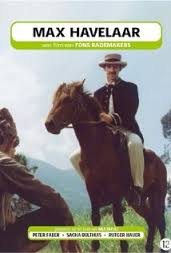
MAX HAVELAAR
Holland/Indonesia, 1976, 163 minutes, Colour.
Peter Faber, Rutger Hauer.
Directed by Fons Rademakers.
This film is based on a 19th century novel and explores the colonial period in Indonesia.
The film has excellent location photography, the re- creation of the period and absorbing character studies. While the film is long, it is strong in its creating a world and inviting the audience into it. It also invites the audience to reflect on the colonial period, the exploitation of indigenous peoples of the islands, the role of the Dutch, their religious stances - and colonial hypocrisy. The film is very well acted, has a stately sense of pace - as befitting an epic of this style.
1. Interesting? Absorbing? A film epic? Dutch- Indonesian co- production? The East Indies of the 19th century? the 19th century? Based on a contemporary novel?
2. Production values: Panavision location photography, re-creation of the period, atmosphere? Music?
3. The opening with the comment of the Dutch on the colonies? The Dutch background, Holland? Civic and religious values? The discovery of the East Indies? The hold of the Dutch? Their business ethos? Their officials? The background of the colonists? The colonial style, affluence, values? The administration and its strictness? The people of the Indies and their lifestyle, oppression, exploitation? Their own chiefs and their wealth and duplicity, cruelty? A perception of the East Indies in the 1950s?
4. The film's comment on Dutch and East Indies values? The reaction about the avant-garde titles of the essays? Formality and proper styles? The comment by the ending of the film - the Dutch piously in church, the lyrics of the hymns that they sang, God being on their side, praying for liberation? The irony of the emptiness of the songs sung and the minds of the singer? An attack on colonialism? The group of people in the church, their dress and manner, faith in God, the majesty and grandeur of the church? Religion justifying the Dutch colonial behaviour?
5. The death of the official, its painfulness, the people in attendance, his wife and children, the doctors? The Regent and his attitude, sympathy? The later discovery that he was poisoned? Cover-ups?
6. The decision to appoint Max Havelaar to the post? The reasons? The family influence? His unorthodox attitudes for the time? An exuberant young man, full of hope? Love for his wife?, The voyage, the recklessness of his going into the shark-infested waters to rescue the dog? His arrival, the pomp and circumstance, his striking the soldier publicly? Enmity towards him? The Regent and the display of wealth and decorum? His settling in, his hopes? His relationship with his wife, his son and the incident with the snake? The information coming in, his uncovering the truth, the deaths, clashing with the Regent? The death of his friend? His being recalled, the discussions about his reports, his being dismissed, the door shut in his face? The charter that he was given for concern for the natives? His inability to put it into practice? His disillusionment? His career, hopes and beliefs?
7. The presentation of the administration, the western ways, European values, politics? The soldiers and their administration of the law?
8. The Regent and his sinister style, his subordinate officials, their killing of the buffalo, their wealth, poisoning the resident? The clash with Havelaar?
9. The natives and their fears, exploitation, hard work? The killing of the buffalo? The Regent and the arrests, the burning of the clothes of the prisoners, executions? The killing of all the people in the village? The use of the soldiers? The local exploiters and their relationship with the Dutch and their own people?
10. The film as an interesting story, also visualising of history, as an exploration of integrity and the themes of the colonial period?
Published in Movie Reviews
Published in
Movie Reviews
Tagged under
Saturday, 18 September 2021 19:34
Mary McKillop
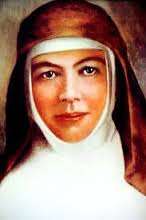
MARY McKILLOP
Australia, 1988, 50 minutes, Colour.
Lorna Lesley, Annie Byron, George Whaley.
Directed by Mark Callan.
Mary Mc Killop is one of the Australians in the Bicentenary project, Mike Willesee's Australians. Mary McKillop? was the founder of the Sisters of St Joseph, an educationalist of the 19th century with forward-thinking ideas. She clashed with various Australian bishops, even being excommunicated at one stage. However, the congregation she founded continued and spread and has offered great service to the church and to education for over 100 years.
Lorna Lesley is effective in making Mary Mc Killop a credible character. There is a good supporting cast including Annie Byron as Joanna. George Whaley is an eccentric Bishop Shiel. While some liberties are taken with the facts for the sake of dramatisation, the dramatising of these incidents in Mary Mc Killop's life gives the opportunity for Australian audiences to understand something of her personality and mission.
1. The choice of Mary Mc Killop for one of Willesee's Australians? The significance of this Bicentenary project?
2. The telemovie style, brevity of length, focusing on particular episodes?
3. South Australia in the 19th century, the 1860s and '70s, the country town, the city? The atmosphere and period? Musical score?
4. Audience knowledge of Mary McKillop? Her impact on the church, founding of the Josephites, her candidacy for canonisation and sainthood?
5. The information given in the film,, the glimpse of her character and personality, her struggles, impact?
6. Lorna Lesley's performance as Mary: her situation, poverty, with her family in South Australia, tutoring? Her religious outlook? Wanting to work for the poor? Bishop Shiel and his attitude? The interest of Julian Tennyson Wood and his collaboration with Mary? Permissions for teaching, for the house? Mary's taking the house and the meeting with Joanna, the clash with Joanna about her faith and the loss of her children? Joanna's continued friendship, Joanna and the healthy birth of her baby, the sadness of its death and Mary's offer of comfort, the mystery of suffering? The woman who joined Mary? The children coming to the school? The situation of education in Australia in the 1870s? Schools for the poor? The clashes with Father Kennedy and his attack on Mary's aims, the ignorance of her sisters, style? The prostitute and Mary's friendliness, her taking the child in for education despite criticism?. The governor and his son and wanting special treatment? her refusal?
7. Bishop Shiel and his character, eccentricities? Friendship with Julian Tennyson Wood, being persuaded and giving permission for Mary's school? The criticisms of Father Kennedy? The pressure of the governor? The establishment of the order, the taking of vows? Financial problems? His pressure on Mary and her refusal? The solemn excommunication? His carriage being rubbished, his presence in the cathedral and people's criticisms?
8. The establishment of the religious order, training, Mary's becoming a nun, the habit, the lifestyle? Jull-an Tennyson Woods and financial difficulties? The opening of the money box? Father Kennedy and his criticisms, inspection, criticisms of the nuns, asking them catechism questions? the prostitute? the excommunication? The people turning against him?
9. Bishop Shiel and his lifting of the excommunication? Mary's success?
10. The boy with the tadpole, the symbol of her success? Joanna and the boy at Mary's grave at North Sydney?
11. Mary's heritage? Impact on Australia?
Published in Movie Reviews
Published in
Movie Reviews
Tagged under
Saturday, 18 September 2021 19:34
Marie
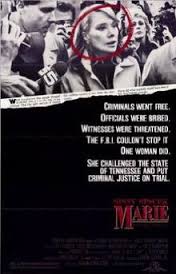
MARIE
US, 1985, 112 minutes, Colour.
Sissy Spacek, Jeff Daniels, Morgan Freeman, Fred Dalton Thompson.
Directed by Roger Donaldson.
Marie is a fine drama about an ordinary woman who gets the opportunity to be involved in American state politics and expose corruption. It is an excellent star vehicle for Sissy Spacek. She is well supported by Jeff Daniels (the hero of The Purple Pose of Cairo) and lawyer Fred Dalton Thompson as himself.
The film was based upon a book by Peter Maas (The Valachi Papers, Serpico, King of the Gypsies). His books have been turned into film by producer Dino de Laurentiis. The music is by Francis Lai, the screenplay by John Briley (Gandhi) and direction is by Australian-born Roger Donaldson who worked in New Zealand in such films as Sleeping Dogs, Smash Palace and made the international film, The Bounty.
The film highlights the courage of an ordinary woman, the dangers in contemporary political situations with the prevalence of corruption. Excellent and thoughtful entertainment.
1. The impact of the film as entertainment? Based on a true story? A message/entertainment film?
2. The film's giving basic facts and information about Tennessee? About the aftermath of the events portrayed in the film? Its authenticity? 'When one good person does nothing, evil flourishes' - a quotation from the film. The film highlighting the significance of this?
3. The focus on Americana, political corruption, in past decades, in the 1970s and '80s? The widespread information to the public about such corruption? The corruption in groups, individuals? Administration, justice and law?
4. The portrait of Marie? Sissy Spacek and her presence and style? Appearance? Change and growth throughout the film? The opening with her being hard done by, her husband and his buddies playing cards and demanding beer, the child crying, her husband violence and literally throwing her out? The separation? Marie as a Catholic, her going to church, her prayer? The application for an annulment? Her reliance on her faith? Her going to her mother, her mother's support? The children with her mother? Her going to work as a waitress, the pressure? Her studying at the same time? The scene of her being late illustrating the pressure? The film's highlighting of her relationship with her children, the attention to domestic detail? Her passing her exams, the possibility of jobs, the interviews?
5. Her friendship with Ed and getting the job from him? Her interactions with the staff? The legal aspects, her signing documents about extradition? Her going to the jail? The attitude of the prisoners towards her? The encounter with Bill Thompson about his role in politics and connection with criminals? The Christmas party? Her being asked to do favours for Ed? The governor being behind the petitions? Her going onto the Parole Board? The government board and its status? The television coverage of her appointment? The reactions of the various officials? The severity of some sentences, the leniency of others? Her seeking information from interstate District Attorneys? Conventions? Ed discussing things with her, his being placated? Her decision to follow things through? The friendship with Kevin, his continued support? Family support? Her stances, the encounters with the governor and his sacking her? Ed and his anger? The danger with her retrieving the documents from her office? The discussions with Fred Thompson? The interviews? The pathos of Kevin's death? His funeral?
6. The build-up to the court case, the interrogation and charges, the State trying to humiliate her? The appeal to the jury? Her winning the case? Setting a precedent? A triumph for justice? Marie as a person, the sincerity of her work, her naivety and discovery of the truth? Her relationship with her family, with Toni and her friendship, Ed? With her secretary - and discovering she was a spy-and sacking her?
7. Marie and her family, the brutality of her husband, the continued friendship and support of Kevin, the friendship of Ed and people assuming that they were having an affair? Her concern about her children, their health, her son and the pistachio nut, the hospital, getting him to breathe again, the device for relieving phlegm and the pressure on herself and her daughters? The holiday, the emergency on the freeway, the discovery of the truth? A fine portrait of family life?
8. Ed and his smooth style, a student of law, jobs, favours? His casual style, golf etc? The contacts with Bill Thompson? His using Marie? Anger, his spies, the denouncing of Marie, the hostile attitude in court?
9. The governor and his style, friendliness, talk, handling the media, interviews with Marie, anger with her, sacking her and calling the TV conference, in court, his prison sentence?
10. Fred Thompson and his support of Marie, listening, handling of the case, evidence and its use, the comparison with the government lawyers and their arranging things? The authenticity of Fred Thompson performing his own role?
11. Bill Thompson and the criminal connections, robberies and violence, murders and the jogger, Marie's visit to the prisons, the Parole Board and the buying of passes, the Parole Board meetings and the interviews, the expectations of the prisoners to be freed? Threats? The members of the board and evidence? Charles Traugher and his suspicions of Marie, hostility towards her especially in the court?
12. Kevin and his work in the office, sociable, jokes, friendship with Marie? His signing the letter against her and its being used after his death in court? His deciding to support Marie? The ugliness of his death and the rumours about it? A martyr for truth, his name blackened by the homosexuality accusation?
13. Toni, the friendship with Marie, support? Marie's mother?
14. A strong drama? The portrait of a person and a personality? An exploration of contemporary American political issues?
Published in Movie Reviews
Published in
Movie Reviews
Tagged under
Saturday, 18 September 2021 19:34
Man With the Gun, The/ 1955
THE MAN WITH THE GUN
US, 1955, 84 minutes, Black and white.
Robert Mitchum, Jan Sterling, Karen Sharpe, Henry Hull, Emilie Meyer, John Lupton.
Directed by Richard Wilson.
The Man With The Gun is a small-scale western, predictable, but nonetheless effective. It was written and directed by Richard Wilson.
It is a star vehicle for Robert Mitchum as a town-tamer~, Jan Sterling is quite stern as his ex-wife and now madam in the town. There is a strong supporting cast.
The film has the town as its focus, has crisp black and white photography, has an atmosphere of tension (akin to High Noon and so many other films of the time) and has an exciting climax.
A typical enough western of any decade - but especially of the '50s.
1. Interesting and enjoyable western? The lawless town? The town tamer? A film of the '50s?
2. Black and white photography, the settings of the town, action sequences? Musical score?
3. The title and its focus on Clint? The reason for his taking the gun, the death of his unarmed father, his reaction, vengeance, his reputation as a town-tamer, his use of the gun, Jeff's use of the gun?
4. The setting of the town, its lawlessness, the rider killing the dog, the business people being afraid, the town council meeting, the possibility of hiring the town-tamer, reluctance, the vote? Leaving Clint to do his work? The interactions with the people? The man with the gun and his rules? Dangers, final confrontation?
5. Robert Mitchum as Clint, drifting through, his reputation as a town-tamer, his story about his father's death and the burning of the house, his own reactions? Being hired? Not wanting intervention? His seeking out Nellie and her refusal to give information, the truth about their daughter? His reaction and the burning of the saloon? His-relationship with the blacksmith, with individual members of the council, at the hotel? With Jeff and Stella and Jeff’s pig-headedness? Stella's attraction? The absence of the town boss? The confrontation with Lescau at the saloon? The deaths of the riders? The final plan, the lawyer and his watching Clint's behaviour? The girl and the set-up? Dade and his coming into town? The shooting, Jeff killing Dade? Clint being wounded, Nellie's contribution to helping foil the plot? Their going off together?
6. Nellie and her bitterness, the death of their daughter, businesswoman, strict with the girls, not wanting scandal, the women of the town wanting them out, the closing down of the saloon, her leaving, her hearing of the plot, trying to foil it? The gallery of girls (and Angie Dickinson in an early role)? Anne and her part in the plot, her fashions and jewels, her being upset?
7. Jeff as the town hero building the house, stances, being shot at, in the hospital? Relationship with Stella? Her concern about him, wanting Clint to help? The capturing of the gunman and the exchange for Jeff? The gratitude? Jeff finally killing Dade? The town council, their business, the blacksmith and his friendship, relationship with his daughter?
8. Dade as the boss, his death? The gunman (including an early role of Claude Akins)? Lescau and his working at the saloon, the knife, his attempt to kill Clint?
9. The picture of the lawless town, the need for justice, the role of the town tamer? The western heritage?
US, 1955, 84 minutes, Black and white.
Robert Mitchum, Jan Sterling, Karen Sharpe, Henry Hull, Emilie Meyer, John Lupton.
Directed by Richard Wilson.
The Man With The Gun is a small-scale western, predictable, but nonetheless effective. It was written and directed by Richard Wilson.
It is a star vehicle for Robert Mitchum as a town-tamer~, Jan Sterling is quite stern as his ex-wife and now madam in the town. There is a strong supporting cast.
The film has the town as its focus, has crisp black and white photography, has an atmosphere of tension (akin to High Noon and so many other films of the time) and has an exciting climax.
A typical enough western of any decade - but especially of the '50s.
1. Interesting and enjoyable western? The lawless town? The town tamer? A film of the '50s?
2. Black and white photography, the settings of the town, action sequences? Musical score?
3. The title and its focus on Clint? The reason for his taking the gun, the death of his unarmed father, his reaction, vengeance, his reputation as a town-tamer, his use of the gun, Jeff's use of the gun?
4. The setting of the town, its lawlessness, the rider killing the dog, the business people being afraid, the town council meeting, the possibility of hiring the town-tamer, reluctance, the vote? Leaving Clint to do his work? The interactions with the people? The man with the gun and his rules? Dangers, final confrontation?
5. Robert Mitchum as Clint, drifting through, his reputation as a town-tamer, his story about his father's death and the burning of the house, his own reactions? Being hired? Not wanting intervention? His seeking out Nellie and her refusal to give information, the truth about their daughter? His reaction and the burning of the saloon? His-relationship with the blacksmith, with individual members of the council, at the hotel? With Jeff and Stella and Jeff’s pig-headedness? Stella's attraction? The absence of the town boss? The confrontation with Lescau at the saloon? The deaths of the riders? The final plan, the lawyer and his watching Clint's behaviour? The girl and the set-up? Dade and his coming into town? The shooting, Jeff killing Dade? Clint being wounded, Nellie's contribution to helping foil the plot? Their going off together?
6. Nellie and her bitterness, the death of their daughter, businesswoman, strict with the girls, not wanting scandal, the women of the town wanting them out, the closing down of the saloon, her leaving, her hearing of the plot, trying to foil it? The gallery of girls (and Angie Dickinson in an early role)? Anne and her part in the plot, her fashions and jewels, her being upset?
7. Jeff as the town hero building the house, stances, being shot at, in the hospital? Relationship with Stella? Her concern about him, wanting Clint to help? The capturing of the gunman and the exchange for Jeff? The gratitude? Jeff finally killing Dade? The town council, their business, the blacksmith and his friendship, relationship with his daughter?
8. Dade as the boss, his death? The gunman (including an early role of Claude Akins)? Lescau and his working at the saloon, the knife, his attempt to kill Clint?
9. The picture of the lawless town, the need for justice, the role of the town tamer? The western heritage?
Published in Movie Reviews
Published in
Movie Reviews
Tagged under
Saturday, 18 September 2021 19:34
Man Who Would Not Die, The
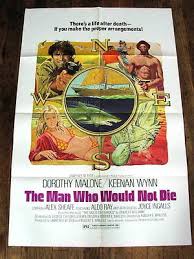
THE MAN WHO WOULD NOT DIE
US, 1976, 83 minutes, Colour.
Dorothy Malone, Keenan Wynn, Aldo Ray.
Directed by Robert Arkless.
The Man Who Would Not Die looks like an episode of any police thriller on television. It has Miami and Caribbean settings. it has action, police, glamour. It is an independent production - and has Dorothy Malone, Keenan Wynn and Aldo Ray having top billing whereas they are in support. (Dorothy Malone has only two scenes.)
The film keeps the attention with its complicated mystery - but is just one of many similar thrillers.
1. Entertaining pastime thriller? Exotic settings? Heroics? Violence and mystery?
2. Location photography, the sea? Special effects and stunt work?
3. The title and its focus on Hardy - and the irony of his cover-ups of his criminal activity? The irony of his dying of a heart attack and nobody believing it?
4. The focus on Mark Rogers as hero? His ship? The burial of the body at sea? Work with Keefer? Audience suspicions after seeing Hardy's fake death? The arrival in Miami? The reports? The ring from Paula Stafford? Keefer and the clashes, his death? Rogers and his being taken and bashed, questioned? The police interrogations? Under suspicion? His beginning his own investigations? The encounter with Paula and his not understanding? Her death? His examining Baxter's belongings? Photos? Contact with his media friend? Travelling to Baxter's home? The discovery of his daughter? His identity? The pursuit of the gangsters? The boat, Roger's getting the upper hand, overboard, being rescued? The resolution of the mystery? The romantic ending?
5. Hardy and his engineering his own death? His being Baxter? The flashbacks explaining his being on Roger's boat, his death? His relationship with Paula Stafford? His swindling the money, gambling in Las Vegas, the gangster group after him? His daughter? The revelation of the truth? The recovery of the money?
6. Keefer and his greed, taking the money, his being tricked by the prostitute, his murder?
7. The gangsters and their arrival at Hardy's house, the killing of the servant, the killing of Keefer, the pursuit of Rogers, torture, the killing of Paula, arrival on the island, the confrontation on the boat?
8. Pat and her work, attitude towards her father, the encounter with Rogers, the common danger, romance?
9. The gallery of characters ranging from the police, media people, Paula Stafford?
10. Popular ingredients of American thriller entertainment? The world of gangsters, crime, cover-ups, police investigations, gangsters, heroes?
Published in Movie Reviews
Published in
Movie Reviews
Tagged under
Saturday, 18 September 2021 19:34
Man Who Finally Died, The
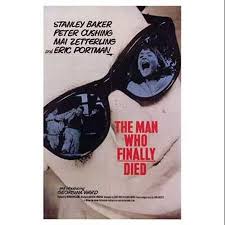
THE MAN WHO FINALLY DIED
UK, 100 minutes, Black and white.
Stanley Baker, Philip Cushing, Mai Zetterling, Eric Portman, Niall MacGinnis?, Nigel Green, Barbara Everest, Harold Scott.
Directed by Quentin Lawrence.
The Man Who Finally Died is an entertaining, British thriller of the early 60s. It is a story of espionage, politics, mystery. Stanley Baker is, as always, a touch hero. There are interesting character portrayals by Peter Cushing, Eric Port-an and Niall MacGinnis?. Mai Zetterling has an ambiguous central role. The film is much the material of television series - but is interesting nonetheless.
1. An entertaining British thriller? War Two mystery?
2. Black and white photography?
3. The title and the focus on Joe's father?
4. European settings? Post-World? European locations? musical score?
5. The irony of his identity? The old man at the end of the film? Resolution of the plot?
6. Joe Newman and his German background, his living in Britain, the information coming from Konigsbaden? His journey to Bavaria? His seeking his father? His getting information from the locals? His father escaping from the iron Curtain? His being in the home of Dr von Brecht? His marriage to Lisa? His death just before Joe's arrival? Joe's suspicions? His visit to the house? Encounters with von Brecht? The evidence that he collected? His encounters with inspector Hofmeister? With Brenner? Growing suspicion? His breaking into the house?
7. The discovery of the old man? The old man being a famous scientist? The kidnap plot for him to be taken back to the East? The resolution with Joe rescuing the man, the clash with Brenner? The background to Joe's stay, the conversations with Brenner and his seeming sympathy? Maria and her refugee background, her help?
8. Dr von Brecht and Peter Cushing's style, the sinister overtones? His reactions to Joe? Being protected? Audience suspicions? The revelation of his being part of the plot to save the old Tan?
9. Lisa as potential heroine? The mystery of her marriage to Joe's father? His growing suspicions, her involvement? The revelation of the cover-up to protect the scientist?
10. Inspector Hofneister and his control in the town, his not helping Joe, putting obstacles in his path, becoming an object of suspicion? His involvement in saving the Professor?
11. Brenner and his insurance background, presence in the town, friendship with Joe? The discovery of the truth about him? The fight and the rescue of the Professor?
12. The background of the people in the house - Martha and her looking after the Professor? The Professor and his being hidden away? His identity? His being substituted for Joe's father?
13. The background of the town, the people at the hotel, police, Maria and her help?
14. Popular ingredients for a mystery espionage thriller? Audience interest, involvement?
Published in Movie Reviews
Published in
Movie Reviews
Tagged under